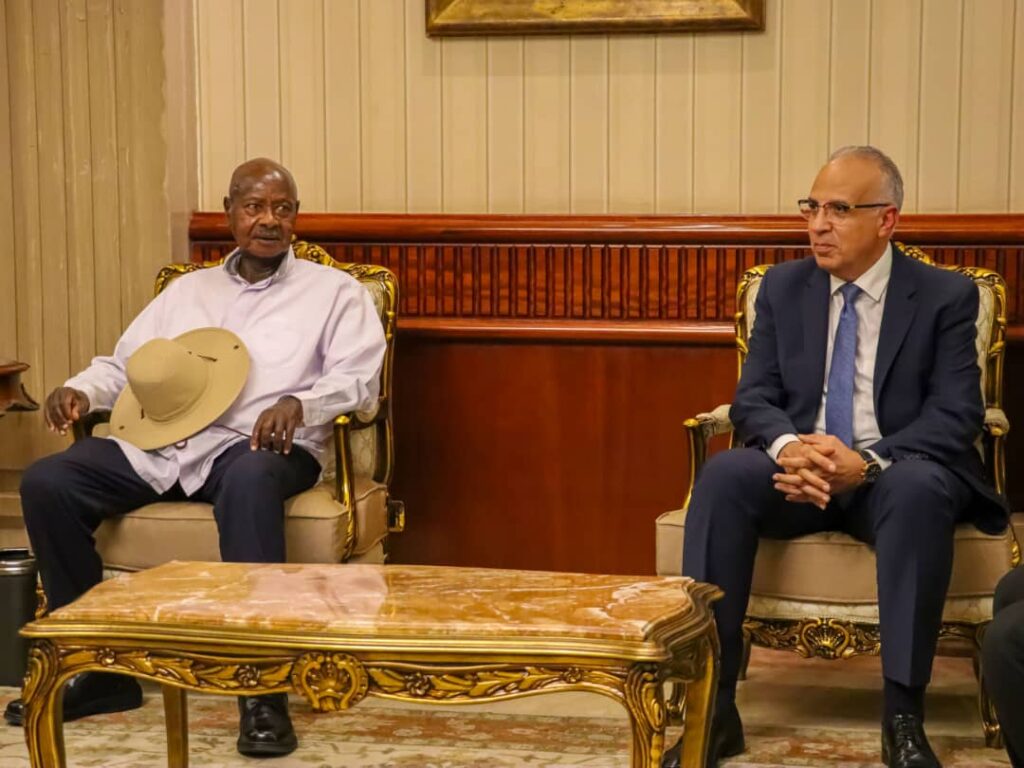President Yoweri Museveni and his Egyptian counterpart, H.E. Abdel Fattah El-Sisi have pledged to deepen historic ties between Uganda and Egypt, anchored by the River Nile and strengthened through decades of Pan-African solidarity.
The two leaders made the announcement today during a joint press conference in Cairo on the second day of President Museveni’s three-day working visit, invited by President El-Sisi.
President Museveni recalled the deep historical linkages between the two nations, both geographical and political.
*“Uganda and the Great Lakes region are linked to Egypt by the Nile from ancient times. Politically, our closeness began in 1952 when President Nasser took leadership here. Before that, we had little contact, but Nasser, as an Africanist, worked closely with our leaders—Julius Nyerere, Kwame Nkrumah—and supported the anti-colonial movement,” he said.
The President stressed that the future of the Nile must be approached with a broader vision.
“Sometimes, the problem is the approach. Instead of limiting ourselves to historical rights, we should focus on the global needs of all Nile Basin countries—prosperity for all, electricity for all, irrigation for all, and clan drinking water for all. If we include these in our framework, we can then use the most scientific and fair methods to achieve them,” he noted.
President Museveni also challenged the perception that Uganda is landlocked, citing its natural connection to the Mediterranean through the Nile, hindered only by political instability in Sudan.
“If there were no problems in Sudan, we would not be called landlocked. We are connected to Egypt because of the Nile.”
On bilateral cooperation, President Museveni praised Egypt’s support in supplying Uganda with foot-and-mouth disease vaccines and welcomed plans to establish a vaccine factory in Uganda.
“I am very happy about that,” he said, adding that economic cooperation should drive Africa’s progress.
“Business is about two things: producing a good or service and someone buying it. If leaders don’t understand this, there can be no prosperity. If you buy what I produce, you are supporting me, and vice versa. That’s why I am glad His Excellency is emphasizing business. Together, we will see how to produce, trade, create jobs, and develop electricity and irrigation for our people.”
He warned against Africa’s overreliance on trade with Europesaying,”“Some African countries made the mistake of focusing only on trading with Europe, but that’s risky—they can block you at any time. Why can’t we trade more among ourselves?”
The leaders also discussed regional challenges, including Libya, Sudan, and Palestine, with President Museveni emphasizing dialogue and peace.
President El-Sisi underscored the Nile’s central role in Egypt and Uganda’s shared destiny.
“The Nile binds us together. Bilateral ties have recently witnessed growing cooperation, and I look forward to more partnerships.”
He highlighted collaboration in water management, agriculture, disease control, and energy, stressing Egypt’s reliance on the Nile.
“Egypt has no other water source; we don’t have rainfall. The Nile is life for us. We are not against development in any Basin country, but we call for equitable water sharing. We must coexist and ensure development does not harm those who depend entirely on this river.”
President El-Sisi thanked President Museveni, saying, “Our discussions have demonstrated great understanding and a shared vision for the future.”
Earlier, landmark Memoranda of Understanding (MoUs) were signed, covering trade, agriculture, water management, and community development. Ministers from both nations formalized agreements on governance, security, foreign affairs, and economic cooperation, paving the way for stronger ties.

